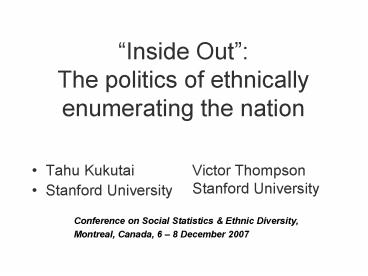- PowerPoint PPT Presentation
Title:
Description:
The politics of ethnically enumerating the nation Tahu Kukutai Stanford University Victor Thompson Stanford University Conference on Social Statistics & Ethnic Diversity, – PowerPoint PPT presentation
Number of Views:15
Avg rating:3.0/5.0
Title:
1
Inside Out The politics of ethnically
enumerating the nation
- Tahu Kukutai
- Stanford University
Victor Thompson Stanford University
- Conference on Social Statistics Ethnic
Diversity, - Montreal, Canada, 6 8 December 2007
2
Motivating the problem
- Ubiquity of ethnicity but variation in state
processes of recognition. WHY? - Case-studies emphasis on dynamics endogenous to
states - Problem 1 Lacks generalizability
- Problem II Ignores global influences
3
The Politics of Ethnic Enumeration
- Scientific rationality vs. political negotiation
- Political process top down vs bottom up
- Typology of ethnic classification regimes -
centered on state motivations (Rallu et al.) - Search for systematic patterns across states
(Morning)
4
Inside Out An alternative approach
Ethnic Cognizance
Inside -Structure -Groups
State Eumeration Practices
Outside -HR Instruments -INGOs
Identity Legitimization
5
Pressures from the inside state-centered
- STRUCTURE
- historical context of state formation
- resources
- GROUPS
- immigrants
- ethnic contenders
6
Pressures from the outside world society
- Integration into global civil society and world
culture - international organizations (INGOs)
- human rights instruments
- Isomorphism in practices
- Expose states to global monitoring and
sanctioning - Opens political opportunities for ethnic activists
7
Hypotheses
- INTERNAL Ethnic recognition
- immigrants
- foreign workers -
- ethnic contenders
- resources
- post-1965 sovereignty
- EXTERNAL Ethnic recognition
- ICERD signatory - or
- ICERD commitment
- INGOs membership
8
Global Enumeration Database on Ethnic Diversity
- Compiled dataset of ethno-racial and civic
identity questions asked in the 2000 Census round
(1995-2004) - Extended to include countries that have
population registers - Coded a wide range of questions
- Nationality
- Citizenship
- Birthplace
- Immigration status
- Race
- Ethnicity Ethnic Origins
- Ancestry, descent
- Indigeneity
- Tribe
- Language, Mother tongue
9
Census Coverage
- Total located in 2000 Census Round
- 184 out of 195 states located in the 2000 Census
Round - 4 had no census available
- 7 remain missing
- Population registries accounted for 8 (n14) of
the sample
- complete by region
- Africa 79
- North America 97
- South America 100
- Asia 97
- Europe 96
- Oceania 96
10
Modeling Ethnic Enumeration
- Two models
- Ethnic Cognizance
- Race, ethnicity, ancestry, indegeneity/tribe, or
mother-tongue - Exclude birthplace, citizenship and religion
- Identity Legitimization
- Formal recognition of specific ethnic groups on
census
11
Commitment to Recognizing Ethnicity Across Regions
- Percentage of States that Recognize at Least One
Ethnic Recognition - Africa 50.0
- Europe 48.9
- South America 80.0
- Asia 67.6
- North America 85.7
- Oceania 63.7
- Percentage of states that formally legitimate
ethnic identities - Africa 20.0
- Europe 35.6
- South America 60.0
- Asia 37.8
- North America 85.7
- Oceania 57.1
12
13
(No Transcript)
14
Summary of Findings
- Internal
- Those emanating from groups
- Those associated with structural conditions
- External
- Commitment
- INGOs
15
Conclusions
- Ethnic Enumeration is generalizable
- Global phenomena
- Despite the local nuances of ethnicity we are
able to extrapolate effects that go beyond ad hoc
explanations of state enumeration practices - Exogenous factors matter






























